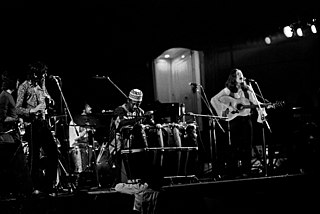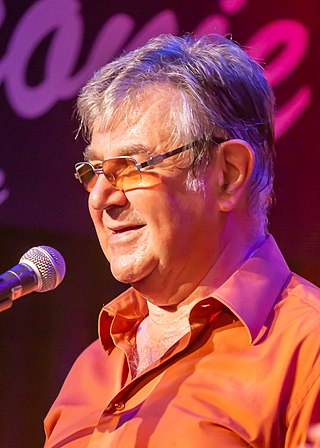
The Campaign for Real Ale (CAMRA) is an independent voluntary consumer organisation headquartered in St Albans, England, which promotes real ale, cider and perry and traditional British pubs and clubs. With just over 150,000 members, it is the largest single-issue consumer group in the UK, and is a founding member of the European Beer Consumers Union (EBCU).

Traffic were an English rock band formed in Birmingham in April 1967 by Steve Winwood, Jim Capaldi, Chris Wood and Dave Mason. They began as a psychedelic rock group and diversified their sound through the use of instruments such as keyboards, sitar, and various reed instruments, and by incorporating jazz and improvisational techniques in their music.

Blind Faith were an English supergroup featuring Steve Winwood, Eric Clapton, Ginger Baker, and Ric Grech. They were eagerly anticipated by the music press following on the success of each of the member's former bands, including Clapton and Baker's former group Cream and Winwood's former group Traffic, but they split after a few months, producing only one album and a three-month long summer tour.

Stephen Lawrence Winwood is an English musician, singer and songwriter whose genres include blue-eyed soul, rhythm and blues, blues rock and pop rock. Though primarily a guitarist, keyboard player and vocalist prominent for his distinctive, soulful high tenor voice, Winwood plays other instruments proficiently, including drums, mandolin, bass and saxophone.

Marston's plc is a British pub and hotel operator. Founded by John Marston in 1834, it is listed on the London Stock Exchange. Marston's disposed of its brewing operations in 2020, selling the assets to a newly formed joint venture with the Carlsberg Group to create the Carlsberg Marston's Brewing Company (CMBC), in which Marston's plc holds a 40% share.
William James Bloye was an English sculptor, active in Birmingham either side of World War II.

Nicola James Capaldi was an English singer-songwriter and drummer. His musical career spanned more than four decades. He co-founded the progressive rock band Traffic in 1967 with Steve Winwood with whom he co-wrote the majority of the band's material. He was inducted into the Rock and Roll Hall of Fame as a part of Traffic's original lineup.

"Gimme Some Lovin'" is a song first recorded by the Spencer Davis Group. Released as a single in 1966, it reached the Top 10 of the record charts in several countries. Later, Rolling Stone included the song on its list of the 500 Greatest Songs.

Christopher Gordon Blandford Wood was a British rock musician, best known as a founding member of the rock band Traffic, along with Steve Winwood, Jim Capaldi and Dave Mason.

The Twisted Wheel was a nightclub in Manchester, England, open from 1963 to 1971. It was one of the first clubs to play the music that became known as Northern Soul.

Mervyn "Muff" Winwood is a British songwriter and record producer, and the elder brother of Steve Winwood. Both were members of the Spencer Davis Group in the 1960s, in which Muff Winwood played bass guitar. Following his departure from the group he became an A&R man and record producer.

The Spencer Davis Group were a British band formed in Birmingham in 1963 by Spencer Davis (guitar), brothers Steve Winwood and Muff Winwood, and Pete York (drums). Their best known songs include the UK number ones "Somebody Help Me" and "Keep on Running", "I'm a Man" and "Gimme Some Lovin'", which reached #2 in the UK and #7 in the US.

Spencer Davis was a Welsh singer and musician. He founded the Spencer Davis Group, a band that had several hits in the 1960s including "Keep On Running", "Gimme Some Lovin'", and "I'm a Man", all sung by Steve Winwood. Davis subsequently enjoyed success as an A&R executive with Island Records.

Peter York is a British rock drummer who has been performing since the 1960s.

With Their New Face On is the fourth studio album by the Spencer Davis Group, the first to be released after the departure of Steve Winwood, and his brother Muff Winwood. The album was released in 1968 in both the UK and the U.S. on the United Artists label.

The Second Album is the second album by the British band the Spencer Davis Group, released in 1966. Many of the songs were a slightly experimental blend of beat, folk, jazz and blues. The album included Jackie Edwards' "Keep on Running", which gave the group their first U.K. number 1 single, and the R&B standard "Georgia on My Mind". The album spent eighteen weeks on the U.K. album chart, peaking at number 3. While the album was not released in the US, the single "Keep on Running" was released in February, 1966, and spent four weeks on the Billboard Hot 100 chart peaking at number 74 on March 12. Other tracks from this album were later released in the U.S. on various compilations of the band.

Revolutions – The Very Best of Steve Winwood is the sixth compilation album by Steve Winwood. The album includes music from Winwood's solo career, as well as groups with which he has performed, including the Spencer Davis Group, Traffic, and Blind Faith. The CD was released as a box set and a single disc. As of October 2014, the box set is out of print, while the single disc is still available. The songs "The Finer Things" and "Roll With It" are exclusive to the single disc version and cannot be found on the box set.
Birmingham's culture of popular music first developed in the mid-1950s. By the early 1960s the city's music scene had emerged as one of the largest and most vibrant in the country; a "seething cauldron of musical activity", with over 500 bands constantly exchanging members and performing regularly across a well-developed network of venues and promoters. By 1963 the city's music was also already becoming recognised for what would become its defining characteristic: the refusal of its musicians to conform to any single style or genre. Birmingham's tradition of combining a highly collaborative culture with an open acceptance of individualism and experimentation dates back as far back as the 18th century, and musically this has expressed itself in the wide variety of music produced within the city, often by closely related groups of musicians, from the "rampant eclecticism" of the Brum beat era, to the city's "infamously fragmented" post-punk scene, to the "astonishing range" of distinctive and radical electronic music produced in the city from the 1980s to the early 21st century.

"When I Come Home" is a song written by Steve Winwood and Jackie Edwards, first recorded by Winwood's band the Spencer Davis Group in 1966. Released as a single that summer, it reached number 12 in the UK Singles Chart. The single received mixed reviews upon release, with Penny Valentine deeming it inferior to their previous singles. The band was featured in the movie The Ghost Goes Gear (1966), miming to the track.

















